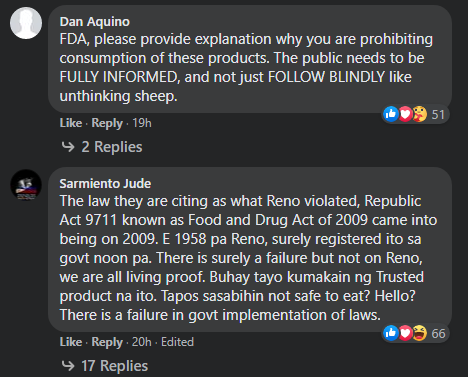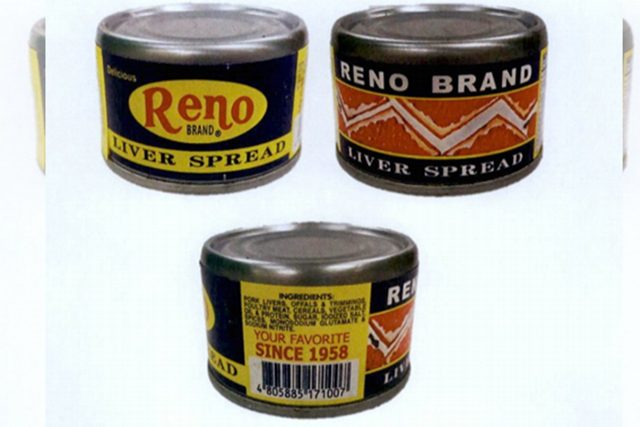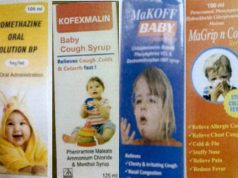The Food and Drugs Administration clarified that the failure to register is the reason why it issued an advisory against a popular local brand of canned good.
On Tuesday, the FDA advised the public against a list of food products and supplements not registered as approved in their system:
- RENO BRAND Liver Spread
- MIRACLE WHITE Advance Whitening Capsules Food Supplement
- TURCUMIN 100% Natural & Standardized Turmeric Curcumin
- DESA Spanish Style Bangus in Corn Oil
- SAMANTHA’S DIPS AND SAUCE Spanish Sardines Paste Sauce
***FDA Advisory No. 2020-1618***The Food and Drug Administration (FDA) warns all healthcare professionals and the…
Posted by Food and Drug Administration Philippines on Tuesday, September 15, 2020
The warning, however, raised questions and criticisms from Filipinos, particularly fans of the long-time Reno Liver Spread.
The affordable liver spread has been an important pairing in Filipino food culture since 1958, which is long before the FDA started registering processed food in 2009.
The brand name “Reno” subsequently trended on Twitter and Facebook.
The comments under FDA’s post were mostly questions addressed to both the state-run agency and Reno on how the brand landed in the list despite it being sold in the market for decades.

Other Filipinos, meanwhile, expressed their frustration over the FDA’s advisory in the form of funny memes.
FDA: Reno Liver Spread isn't registered!!
Reno Liver Spread and its stans: pic.twitter.com/d74NhYJKrR
— seiruhhhh 👀 (@lakwatsarah) September 16, 2020
In the advisory, the FDA stated that these products are prohibited because they don’t have certificates of product registration (CPR).
This therefore, prevents FDA officers from evaluating their safety and quality to consumers.
Clarification
Following the negative feedback online, FDA Director-General Eric Domingo, who is also the Health Undersecretary, issued a statement on the registration of Reno liver spread, citing its failure to register its business as a processed food product.
***PRESS STATEMENT: FDA REGISTRATION OF RENO BRAND LIVER SPREAD***The Food and Drug Administration (FDA) requires…
Posted by Food and Drug Administration Philippines on Wednesday, September 16, 2020
“This year, FDA inspectors collected samples of RENO Brand Liver Spread for verification of their CPR. Upon extensive search of FDA databases, the mentioned liver spread failed to secure a CPR,” Domingo said.
“Thus, the FDA has a responsibility to inform the public, through an advisory, that RENO Brand Liver Spread is NOT REGISTERED as of this date as a processed food product and must secure the required authorization from this Office,” he added.
What Reno Foods, Incorporated secured is the License-to- Operate (LTO) in 2017 as food repacker and manufacturer of processed meat products.
“RENO Foods, Incorporated, the manufacturer of RENO brand Liver spread has an existing LTO as food repacker. In 2017, the company applied for the variation of their LTO to include their product line as manufacturer of processed meat products. Upon inspection of the FDA, the company was granted approval of the LTO as manufacturer,” Domingo said.
Domingo also earlier noted that these brands, particularly the Reno liver spread, might have just failed to register its business.
“Mukhang never nag register kasi mas matanda pa sa atin at sa FDA yan. Don’t be worried, kailangan lang sila mag register and prove na okay ang product nila,” he said.
Both the CPR and LTO are the two mandated types of certification that FDA requires from business operators and owners before their products are released in the Philippine market.
The LTO is a certificate or authority granted to “manufacturers, repackers, importers, distributors, wholesalers, traders who passed FDA guidelines such as Good Manufacturing Practices.”
The CPR, meanwhile, include “checking of the safety and quality of a respective product with applicable standards and issuances.”
These requirements are pursuant to Republic Act 9711 or the FDA Act of 2009, which created the agency.










